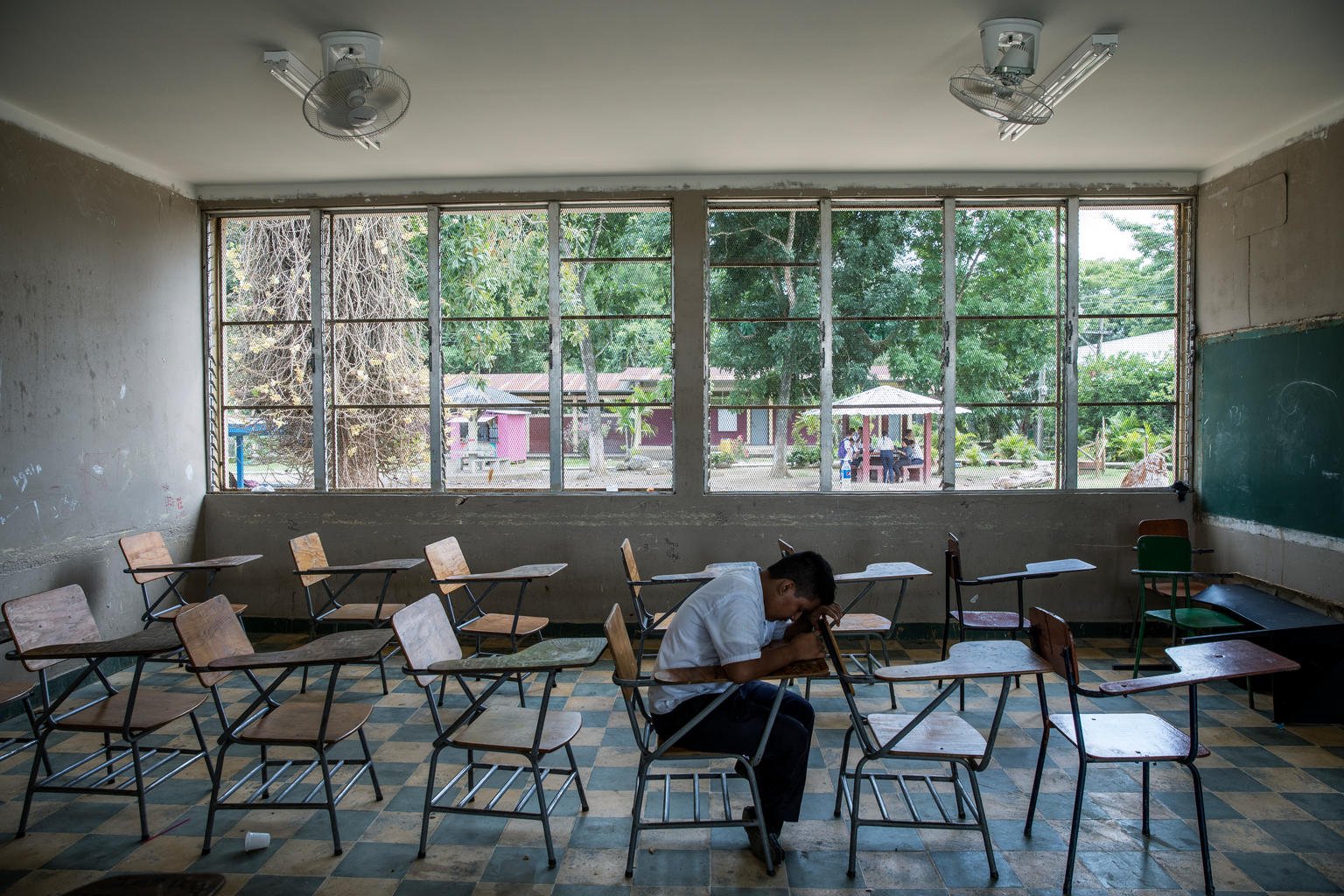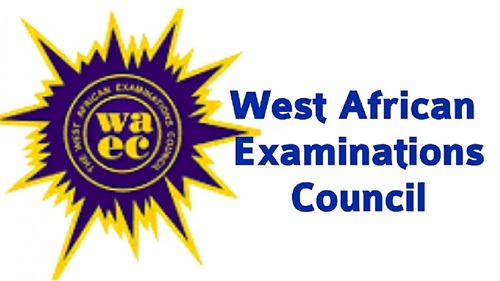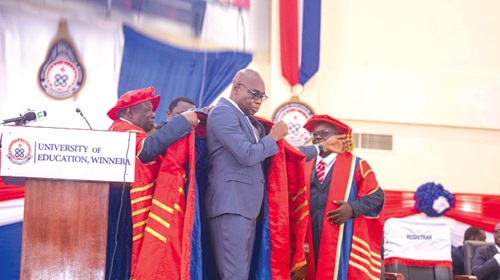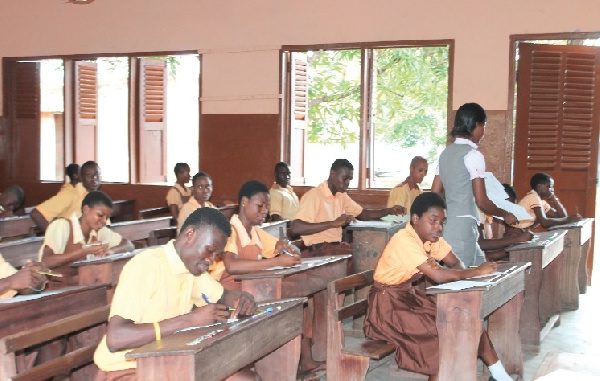Psychological Violence of teachers on students in Ghana and the inherent punishment

On 31 August 2018 in Villanueva, Honduras, Josseline Rodriguez (left), 17, and Darwin Martinez, 16, sit in the classroom that they shared with their friend Henry. Henry committed suicide in September of 2016. According to a teacher, the three close friends were targeted by bullies. Henry was seen as popular and caring boy, but Darwin reports that Henry's grades went down after an episode of bullying. "I was hit very hard," says Darwin, "I still can't get over it."In 2018 in Honduras, societal violence has had a profound impact on a child’s ability to remain in school. This is especially true in neighbourhoods of the main urban areas including Tegucigalpa, Comayagüela, Choloma, San Pedro Sula, Villanueva, El Progreso and La Ceiba, in which gangs and organized crime, not only exercise effective territorial control over these areas but are also responsible for violent deaths, extortions, movement restrictions and threats. In 2017, the school coverage rates for children and adolescents aged 3-17 years was 58 per cent, meaning that 42 per cent of children did not have access to education. In 2010, only 55 per cent of children who began primary school were able to graduate from it.According to UNICEF, half of students aged 13-15 worldwide – around 150 million – report having experienced peer-to-peer violence in and around school. Peer violence – measured as the number of children who report having been bullied in the last month or having been involved in a physical fight in the last year – is a pervasive part of young people’s education around the world. It impacts student learning and well-being in rich and poor countries alike.
Psychological violence in schools against students or learners is not new Ghana. Many from the past to the present have been victims. Teachers’ negative psychological effects on a school child can have a long-lasting effect on the learner.
All manner of actions such as intimidation, insults, teasing, harassing, threatening, snubbing and discriminating against any child by virtue of his or her race, colour, gender and other related behaviours harm learners and emotionally derails them in many aspects of life.
READ: Poverty No Longer A Barrier To Education In Ghana-Prez Akufo-Addo
Students have lost hope, others have felt they are not good, some have had their dreams shattered because of comments teacher passed which had negative effects on them.
Below are the rules by GES to guide the actions of teachers to ensure they are not only aware of the psychological violence acts, statements and behaviours that the teaching profession frowns on in Ghana.
Psychological violence of teachers on students
No act of a staff shall have a negative psychological effect on a school child. Therefore, no staff in the course of duty shall intimidate, insult, tease, harass, threaten, snub or discriminate against any child.
An employee shall not use the physical challenge of children to intimidate or ridicule them.
READ: Apor for passing 2020 BECE and WASSCE exams
A staff shall not by any means or action compel students into activities of which they do not have a clear understanding.
No employee shall deliberately isolate or ignore any child.
The staff shall advice against early marriage and support children continuing their education.
READ: Coronavirus, the game-changer in family life and child care
No employee shall emotionally manipulate a child to the staff’s advantage.
No staff shall send a child out of class for absenteeism or lateness.
An employee shall show maximum consideration for feeling and circumstances of learners.
The staff shall control his/her utterances in order not to threaten with cruel and degrading punishment or hurt the pupil/student.
An employee will intervene to stop a pupil/student from perpetrating psychological abuse upon another pupil/student.
A staff shall intervene to stop a fellow employee from perpetrating psychological abuse upon another pupil/student.
 SOD CUTTING CEREMONY FOR THE MIIF TECHNICAL TRAINING CENTRE
SOD CUTTING CEREMONY FOR THE MIIF TECHNICAL TRAINING CENTRE  UMaT SRID Students Have Successfully Design An Innovative LawnMower
UMaT SRID Students Have Successfully Design An Innovative LawnMower  The New WhatsApp AI And Dangers Of Exam Malpractices During 2024 BECE and WASSCE
The New WhatsApp AI And Dangers Of Exam Malpractices During 2024 BECE and WASSCE  Prof. Mitchual inducted 5th VC of UEW
Prof. Mitchual inducted 5th VC of UEW  Don’t Politicise Education – NUGS President Urges Flag Bearers
Don’t Politicise Education – NUGS President Urges Flag Bearers  GES announces 2024 BECE supervisors, invigilators, and dispatchers vacancies
GES announces 2024 BECE supervisors, invigilators, and dispatchers vacancies  Alan will demonstrate leadership and will not run a corrupt government; give him chance to be Ghana’s president’- Buaben Asamoa
Alan will demonstrate leadership and will not run a corrupt government; give him chance to be Ghana’s president’- Buaben Asamoa  2024 Election: Bawumia set to tour Bono, Ahafo regions May 8
2024 Election: Bawumia set to tour Bono, Ahafo regions May 8  Race for the Premier League: Championship Playoffs 2024
Race for the Premier League: Championship Playoffs 2024  ‘Really isn’t normal!’ – Messi Backed to Win NINTH Ballon d’Or
‘Really isn’t normal!’ – Messi Backed to Win NINTH Ballon d’Or